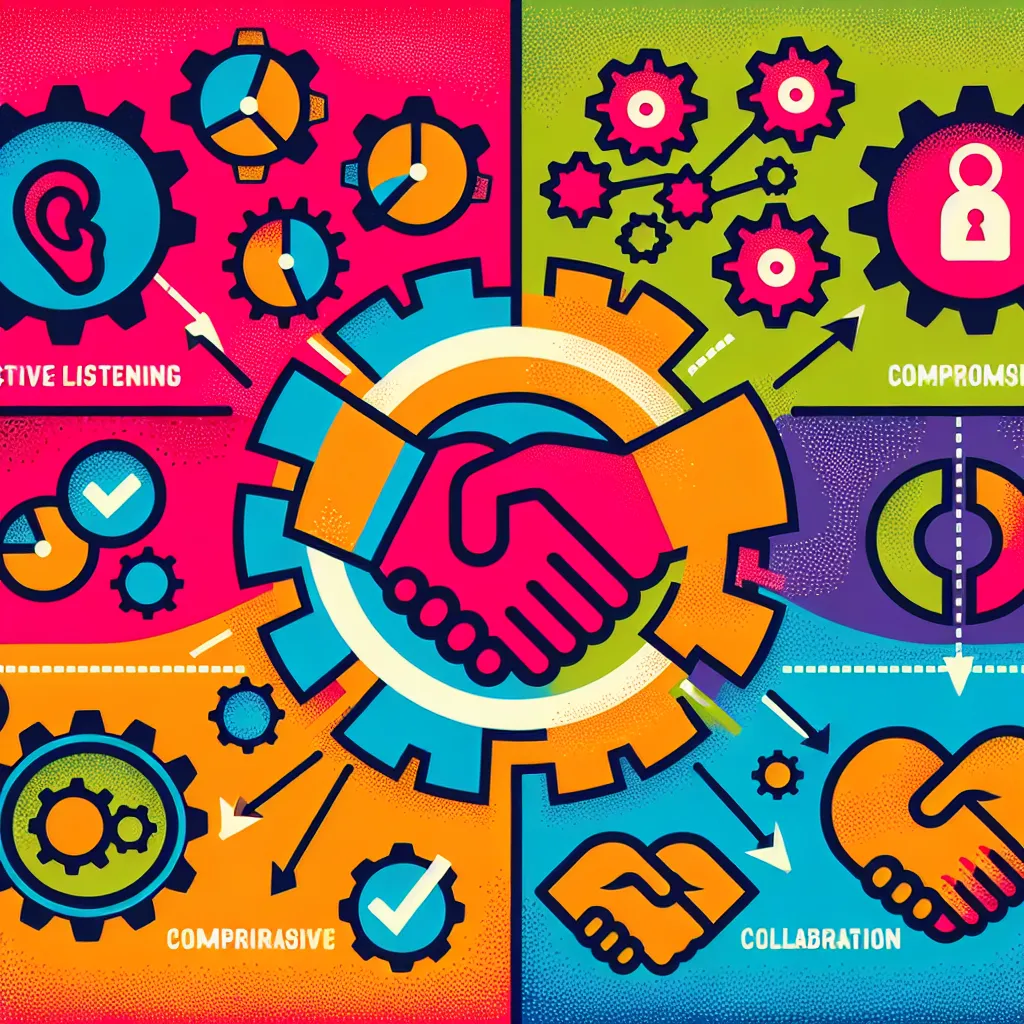Working with difficult people is a common challenge in both personal and professional settings. This topic frequently appears in IELTS Speaking tests, particularly in Part 2 and Part 3. Being prepared to discuss such experiences can significantly boost your performance in the exam. Let’s explore how to effectively address this topic and maximize your score.
Nội dung bài viết
- Part 1: Introduction and Interview
- Question: Do you prefer working alone or in a team?
- Part 2: Long Turn
- Describe a time when you had to work with someone difficult
- Follow-up questions:
- Part 3: Two-way Discussion
- Question 1: Why do you think some people are difficult to work with?
- Question 2: How can companies effectively manage conflicts between employees?
- Key Vocabulary and Phrases for High Scores
- Examiner’s Advice
Part 1: Introduction and Interview
In this section, the examiner may ask general questions about work or relationships. Here’s a sample question with a suggested answer:
Question: Do you prefer working alone or in a team?
Band 6-7 Answer:
I generally prefer working in a team. It’s often more enjoyable and productive to collaborate with others. However, there are times when I appreciate working alone, especially for tasks that require deep concentration.
Band 8-9 Answer:
While I recognize the merits of both approaches, I tend to gravitate towards teamwork. The synergy that emerges from diverse perspectives often leads to more innovative solutions. That said, I do value solitary work for tasks that demand intense focus or creativity. Ultimately, I believe the ideal work environment strikes a balance between collaborative and individual efforts.
Part 2: Long Turn
Here’s a sample cue card related to the topic:
Describe a time when you had to work with someone difficult
You should say:
- Who this person was
- What the situation was
- How you dealt with the situation
- And explain how you felt about it
Band 6-7 Answer:
I’d like to talk about a time when I had to work with a difficult colleague on a group project at university. This person was a classmate named Tom, who was known for being uncooperative and often confrontational.
The situation arose when we were assigned to work together on a presentation for our marketing class. From the beginning, Tom was reluctant to contribute and often missed our scheduled meetings. When he did show up, he would argue against every idea without offering alternatives.
To deal with the situation, I tried to maintain open communication with Tom. I scheduled one-on-one meetings with him to understand his perspective and concerns. I also made an effort to acknowledge his input when he did contribute, hoping to encourage more positive participation.
Despite the challenges, I felt that this experience was ultimately valuable. It taught me important lessons about patience, diplomacy, and problem-solving in difficult interpersonal situations. While it was frustrating at times, I believe I emerged from the experience with stronger leadership and communication skills.
Band 8-9 Answer:
I’d like to recount an experience from my professional life where I had to collaborate with a particularly challenging individual on a high-stakes project. The person in question was a senior colleague, let’s call him Mr. Johnson, who was renowned for his abrasive personality and uncompromising approach to work.
The situation unfolded when our department was tasked with overhauling the company’s customer service strategy. Mr. Johnson and I were appointed as co-leads, a decision that initially filled me with trepidation given his reputation. From the outset, he was dismissive of my ideas and often undermined my authority in team meetings.
To navigate this delicate situation, I employed a multi-faceted approach. Firstly, I made a concerted effort to understand Mr. Johnson’s perspective, scheduling regular one-on-one meetings where I actively listened to his concerns and ideas. Secondly, I focused on our shared goals, consistently steering conversations back to the project’s objectives rather than personal disagreements. Lastly, I sought to leverage his strengths, assigning him tasks that aligned with his expertise, which helped to build mutual respect.
Reflecting on this experience, I feel it was an invaluable learning opportunity. While it was undoubtedly stressful and, at times, disheartening, it honed my conflict resolution skills and bolstered my emotional intelligence. The situation taught me the importance of maintaining professionalism in the face of adversity and the power of finding common ground even in seemingly impossible situations. Ultimately, we delivered a successful project, and I emerged from the experience with a newfound confidence in my ability to handle complex interpersonal dynamics in the workplace.
 Difficult colleague in workplace
Difficult colleague in workplace
Follow-up questions:
- How did this experience change your approach to teamwork?
- What advice would you give to someone facing a similar situation?
Band 6-7 Answers:
-
This experience made me more patient and understanding in team settings. I now try to see things from others’ perspectives and find ways to work together effectively.
-
I would advise them to stay calm, communicate clearly, and focus on the shared goal rather than personal differences.
Band 8-9 Answers:
-
This experience was truly transformative for my approach to teamwork. It heightened my emotional intelligence and made me more adept at reading interpersonal dynamics. I’ve become more proactive in addressing potential conflicts early on and more skilled at creating an inclusive environment where diverse personalities can thrive.
-
I would advise them to approach the situation with empathy and strategic thinking. It’s crucial to understand the root causes of the difficult behavior and to separate the person from the problem. I’d also emphasize the importance of setting clear boundaries while remaining open to compromise. Lastly, I’d remind them to document all interactions and seek support from supervisors or HR if the situation becomes untenable.
Part 3: Two-way Discussion
In this section, the examiner will ask more abstract questions related to the topic. Here are some potential questions with suggested answers:
Question 1: Why do you think some people are difficult to work with?
Band 6-7 Answer:
There can be many reasons why some people are difficult to work with. It might be due to personality clashes, different working styles, or personal issues affecting their behavior. Sometimes, it’s just a matter of poor communication or misunderstandings.
Band 8-9 Answer:
The reasons behind challenging work relationships are often multifaceted and complex. In many cases, it stems from a misalignment of values or expectations. Some individuals may have deeply ingrained behavioral patterns or unresolved personal issues that manifest in the workplace. Additionally, organizational culture can play a significant role – a highly competitive environment, for instance, might foster difficult behaviors. It’s also worth considering that what we perceive as ‘difficult’ might simply be a different approach or communication style that we’re not accustomed to. Understanding these underlying factors is crucial in addressing and mitigating workplace conflicts.
Question 2: How can companies effectively manage conflicts between employees?
Band 6-7 Answer:
Companies can manage conflicts by providing clear guidelines for behavior and establishing a fair system for resolving disputes. They should also offer training on communication and teamwork. Having a neutral mediator to help resolve conflicts can be very useful.
Band 8-9 Answer:
Effective conflict management in organizations requires a multi-pronged approach. Firstly, companies should foster a culture of open communication where employees feel safe to voice concerns. Implementing robust conflict resolution protocols and providing regular training on emotional intelligence and interpersonal skills can be highly effective. Additionally, companies can benefit from establishing mentorship programs that pair experienced employees with newer ones, facilitating better understanding across different levels of the organization. It’s also crucial for management to lead by example, demonstrating constructive ways to handle disagreements. Lastly, regular team-building exercises and cross-departmental collaborations can help build empathy and understanding among employees, potentially preempting conflicts before they arise.
Key Vocabulary and Phrases for High Scores
-
Abrasive (adjective) /əˈbreɪsɪv/ – Showing little concern for the feelings of others
Example: His abrasive personality made it difficult for others to work with him. -
To undermine (verb) /ˌʌndəˈmaɪn/ – To weaken or damage someone or something, especially gradually or insidiously
Example: Her constant criticism undermined my confidence in the project. -
To leverage (verb) /ˈlevərɪdʒ/ – To use something to maximum advantage
Example: We leveraged his expertise in data analysis to improve our marketing strategy. -
Emotional intelligence (noun) /ɪˈməʊʃənl ɪnˈtelɪdʒəns/ – The capacity to be aware of, control, and express one’s emotions, and to handle interpersonal relationships judiciously and empathetically
Example: Developing emotional intelligence is crucial for success in today’s workplace. -
To bolster (verb) /ˈbəʊlstə(r)/ – To support or strengthen
Example: The positive feedback bolstered my confidence in my presentation skills.
Examiner’s Advice
To achieve a high score in the IELTS Speaking test when discussing difficult work situations:
- Use a range of sophisticated vocabulary and complex grammatical structures.
- Provide specific examples to illustrate your points.
- Demonstrate critical thinking by analyzing the situation from multiple perspectives.
- Show awareness of cultural differences in workplace interactions.
- Practice speaking fluently and coherently about challenging work scenarios.
Remember, the key to success is not just in what you say, but how you say it. Aim for natural, fluent speech with a variety of sentence structures and vocabulary. Good luck with your IELTS preparation!
For more tips on IELTS Speaking, you might find these articles helpful:


